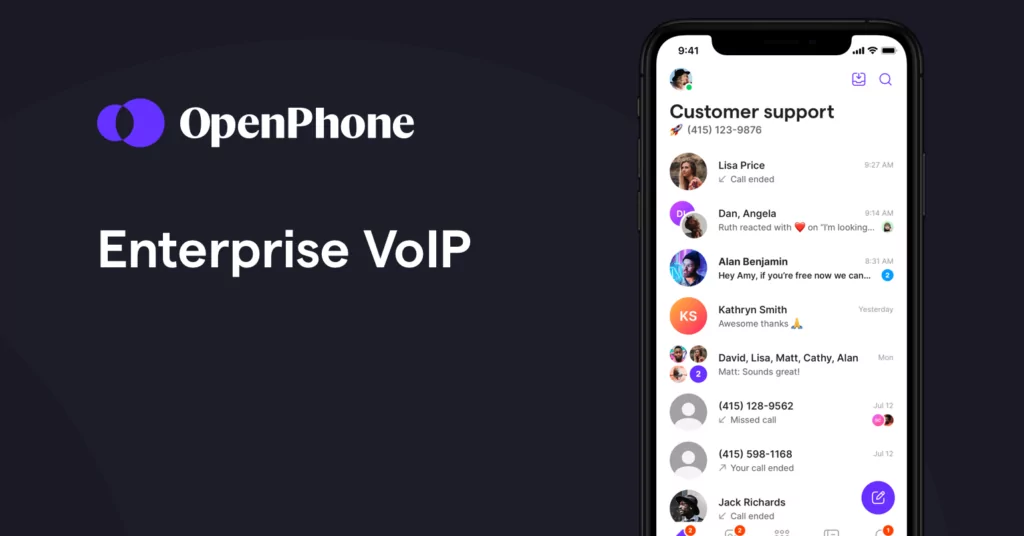Scaling organizations need tools that can grow with them. What’s one of the most important, mission-critical tools your growing business needs to get right? Your business phone system.
Standard desk phones are clunky, outdated systems that can suffer from dropped calls, poor sound quality, and high operational costs — which isn’t a winning formula for a growing business. To boost team collaboration and custothremer service, it may be time to make the switch to a VoIP platform (or if you’re already using VoIP, make the switch to a platform that can meet your needs).
Growing teams need to find an enterprise VoIP solution that fits their needs. While many VoIP providers are designed for small businesses, an enterprise solution is built specifically for larger companies. Below, we dive into what enterprise VoIP is, how to choose the right provider for your budget and bandwidth, questions to ask a potential enterprise VoIP provider, and more.
What is an enterprise VoIP service?
Most business VoIP plans are well suited for entrepreneurs, small businesses, and startups. However, you might need a more robust solution for your team.
An enterprise Voice over IP solution is a high-grade service built explicitly for the needs of large organizations. VoIP systems can easily add lines or phone numbers, without the hassles associated with a traditional phone system (i.e., systems tied to phone lines and copper wires).
How to know if an enterprise VoIP service is right for your team?
Most — if not all — VoIP providers offer tiered pricing plans that increase functionality with each subscription level. If you’re determining whether you need a basic, premium, or enterprise plan, ask yourself these questions:
- What’s the size of your team? The top reason to switch to an enterprise solution is the size of your team. If you have more than 100 people on your team, it may be time to think about an enterprise solution.
- Do you have complex requirements? Many VoIP services offer features you’d never get from a basic analog telephone, including call recording, SMS, and team messaging. However, if your team has specific needs that extend beyond the features listed in a provider’s premium plan, it may be time to switch to enterprise.
- Do you have a large sales or recruiting team? If your business does a large amount of outbound calling or receives a high volume of inbound calls, such as for sales or recruiting, an enterprise VoIP solution might be necessary.
- Do you need a dedicated account manager? If you need someone to provide guidance on setting up your new phone system including best practices, you may need a dedicated account manager. This white-glove level of customer support typically only comes with enterprise service plans.
How can businesses make the switch to an enterprise VoIP solution?
When swapping out your business phone system, many VoIP solutions come with upfront setup costs. To offset these costs, many service providers use VoIP gateways.
When switching from an analog service to a VoIP solution, some services offer multiple PBX gateways to help make the transition. A VoIP gateway allows businesses to take advantage of their existing hardware, while gaining access to VoIP technology. PBX stands for private branch exchange and connects multiple business phones to the same network. With a PBX/PABX system, you can have more lines than physical phones in the office, transferring calls through extensions. In addition to multiple phone lines, a PBX enables call routing, call forwarding, and voicemails.
Why choosing a phone system with a virtual PBX eases the transition
Using gateways — in theory — helps businesses with the hassle of overhauling their entire business phone system. However, this band-aid fix will most likely need to be swapped out later on, thereby increasing costs, requiring additional hardware, and creating more work for your IT department. Instead, choose a system that is easy to set up and maintain, preventing the need for a gateway solution.
Choosing a business phone system with a cloud PBX cuts down on hardware while easing the transition to a VoIP service. With a virtual PBX, your phone is hosted in the cloud, allowing team members to access the system through their computers, mobile phones, or tablets. You can easily onboard new teammates in minutes.
Bottom line: virtual PBX provides more flexibility and the ability to tailor systems to business’ needs while still being less complicated and expensive than gateways.
Different types of hosting providers for enterprise VoIP systems
When it comes to hosting a VoIP service, there are two options: on-premise or cloud-based providers. Here’s what you need to know about both options, and how it can influence business communications costs and maintenance at your company.
On-premise VoIP systems
An on-premise system requires you to maintain hardware at your company’s physical location. In this case, you’ll need to dedicate a room (or entire floor!) of your office to house an on-site IP PBX.
Hosting your VoIP service on-site requires a third party for setup and a robust, internal IT department to handle maintenance. You will need to handle all security issues yourself and hire more in-house IT staff as you continue to scale your company.
Hosted VoIP systems
With a hosted phone system, there is no hardware at your physical company — which can make the setup process much easier. In addition, a third party handles maintenance and ongoing security, which can increase cost savings for your company.
One disadvantage of a hosted VoIP system is you rely on a third party to design a system tailored to your needs. However, if you choose the right hosted VoIP provider, this isn’t an issue, as a dedicated account manager can ensure your solution fits your needs.
How do you choose an enterprise VoIP provider for your business?
When choosing an enterprise VoIP phone system, you need to choose a provider that fits your budget and usage. Below, we guide you through various questions to ask and items to consider when choosing your provider:
Does your enterprise VoIP provider fit your budget?
When choosing a solution for your business, you want to ensure it fits your budget. Unfortunately, many enterprise solutions’ pricing plans depend on your company’s specific needs. This means that your monthly cost will vary — here are several questions to ask to find the most cost-effective solution:
- Will there be startup costs? Some VoIP providers charge hefty startup costs, including swapping out hardware or upgrading equipment.
- Will there be ongoing maintenance? If an enterprise solution uses outdated or on-site equipment, this can be expensive to maintain.
- Do you need to port additional phone numbers? If you want to port existing phone numbers, this may factor into your cost. If at all possible, search for a provider that offers free number porting.
- Are there any additional costs? Many solutions advertise advanced features, but require an upgrade. Be sure to discuss any additional costs with your sales contact.
Do you have enough bandwidth?
Since VoIP solutions run through your internet provider or data plan, you need to ensure you have enough bandwidth. Unlimited calling and messaging with clients and prospects uses a lot of data, and if you don’t have enough bandwidth, you could experience dropped calls.
The amount of bandwidth you need depends on how many phone lines your company needs. In other words, if you’re a small team that needs just five lines, you need much less bandwidth than a team of 50.
The average phone line requires 100 kilobits per second (Kbps) to support a phone call. If you have a team of 10, this multiplies to 1 megabit per second (Mbps). Likewise, if you employ a staff of 100, you will need 10 Mbps.
With that being said, you may want more bandwidth to improve the following:
- Sound quality: If you want HD-level sound quality, you will need more bandwidth. For the best sound quality to easily hear your customers and sales prospects, you might need more bandwidth.
- Download speeds: The more bandwidth you have, the quicker the download speed. Therefore, having more bandwidth will prevent delays or gaps in conversations with customers.
It’s worth noting that as more businesses embrace remote or hybrid work, your employees may be using VoIP phone service from their own devices, off premise. When that’s the case, you also need to consider the available bandwidth on their personal internet or data plans.
Questions to ask an enterprise VoIP provider
Enterprise VoIP solutions are usually custom plans tailored to the individual company. Therefore, you will likely speak directly with a salesperson when purchasing a service, rather than buying an out-of-the-box plan online. Here are a few questions you should ask to find the best solution:
- Will I have a dedicated account manager?
- What does it cost to add additional phone numbers?
- Will we be hosting on-site?
- Are there additional setup costs involved?
- What are the monthly costs and fees?
- How often do new releases of your software occur?
- Can my team keep their existing phone numbers?
- Can team members have more than one phone number?
- Do we have to use specific voice over IP phones, routers, faxing, or other equipment?
- Can my team use their own mobile devices?
- Can my team place calls anywhere in the world? What are your international calling rates?
- How do customers participate in product development and the platform’s roadmap?
- How does my team invite new members to the account?
- How much bandwidth do I need for a team of X people?
- Do you integrate with other third-party tools? Which ones?
- What features do you offer that will make my team’s lives easier (caller ID, auto-attendant, snippets, team messaging, call recording, etc.)?
- Are there contracts? What are the terms?
- Do you offer installation and training? If not, is your solution easy to use?
- Have clients ever experienced a loss in connectivity using your service? How often?
- Do you provide an SLA?
Comparing 5 enterprise VoIP providers
As you begin searching for an enterprise solution, you’ll want to compare multiple providers. Here are several leading providers you may want to include in your search.
1. OpenPhone
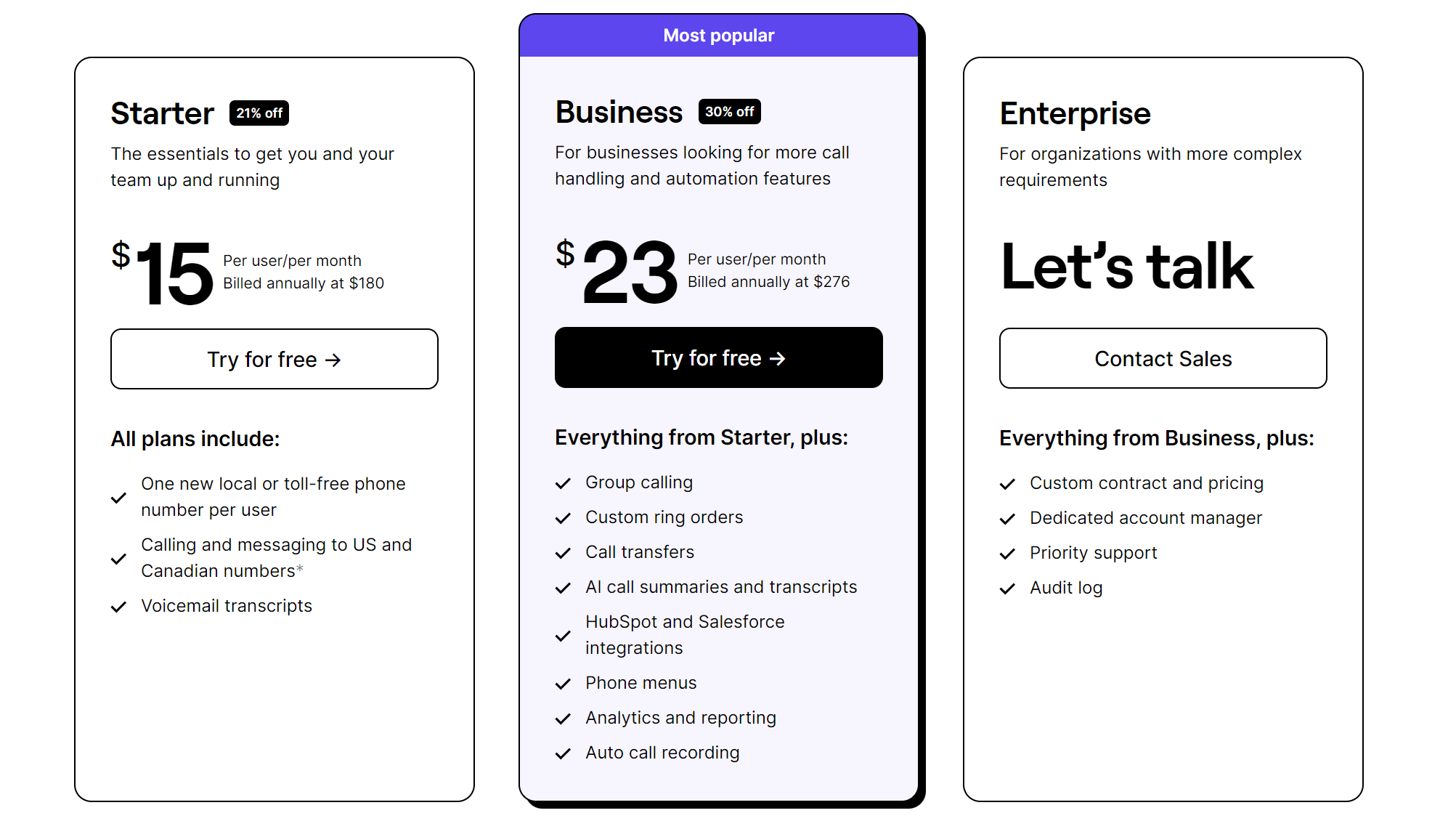
OpenPhone is an easy-to-use enterprise VoIP app that works with your team’s existing cellphones. The setup process takes less than two minutes and doesn’t require any maintenance, an internal IT department, or hidden setup fees.
OpenPhone offers an entire suite of services that improves your team’s work and ability to collaborate. With OpenPhone, team members can easily review the communication history with any business contacts and internally comment on external conversations to work together and stay aligned. If you’re in charge of a team that relies on calling and texting, you can also review call recordings, add an auto-attendant, set up automated text replies and workflows, and add team members to any shared phone number in minutes. OpenPhone also integrates with Slack, HubSpot, Gmail, and Zapier, and Salesforce. Lastly, you get a dedicated account manager to manage any issues for your team.
We’ll work with you on setup and ensure you get the best plan that helps your team succeed. Reach out to our sales team.
2. magicJack

magicJack was one of the first VoIP providers in the industry. It offers features including three-way calling, caller ID, call blocking, voicemail, and call forwarding. You can also purchase add-on services, like virtual fax and auto-attendant, for an additional charge. Your team can purchase a magicJack softphone for $54.99 or download the magicJack app to their cellphones for business use. (Note: magicJack doesn’t offer a separate business address book or other tools to keep business and personal calls separate.) After that, plans start at $15.99 per line per month.
magicJack advertises themselves as a small-business solution, so it may not meet your enterprise needs. Plus, you will not have a dedicated account manager to handle any unforeseen issues.
3. Ooma
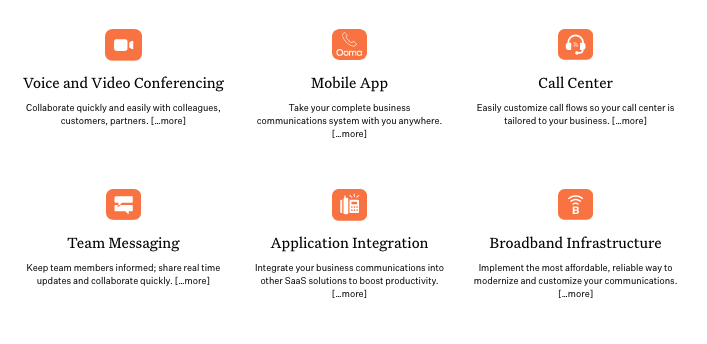
Ooma’s enterprise solution is tailored to fit large businesses and call centers. Ooma offers team messaging, video conferencing, and mobile apps to help improve unified communications at your company. Plus, Ooma offers third-party integrations with Salesforce, Google Workspace, Zendesk, and other tools to help improve team efficiency. Ooma’s enterprise customers get a dedicated customer success manager to help tailor their plan to their business needs.
Unfortunately, some users have complained Ooma’s interface isn’t user-friendly and the setup isn’t intuitive. Others have mentioned they dislike Ooma uses proprietary desk phones and the inability to differentiate business calls from personal calls on a cellphone.
With Ooma, enterprise plans are $49.99 per person per month, with a contract in place.
4. Google Voice
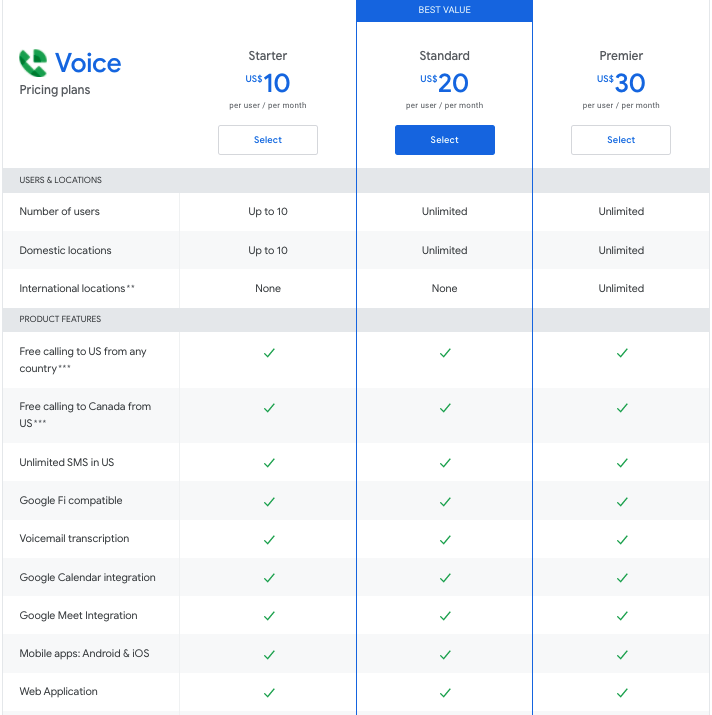
Google Voice for Google Workspace is an easy-to-use VoIP phone service built for small teams and corporations — but only if you already have a Google Workspace account. Google Voice easily transcribes calls and voicemails, provides an auto-attendant, and creates ring groups for team members. Plus, it integrates with other Google Workspace tools (like Google Meet and Google Calendar).
Unfortunately, with Google Voice, team members can’t pick their own number, access toll-free numbers (which isn’t a viable solution if you have a call center), share or have multiple phone numbers, or have a dedicated business address book. Another downside is Google Voice only integrates with other Google tools, like Gmail and Google Calendar.
Pricing for Google Voice’s premier plan starts at $30 per month per user. Keep in mind, to use Google Voice for Google Workspace, you need to have an active Google Workspace plan, which adds to your overall monthly cost.
5. Nextiva
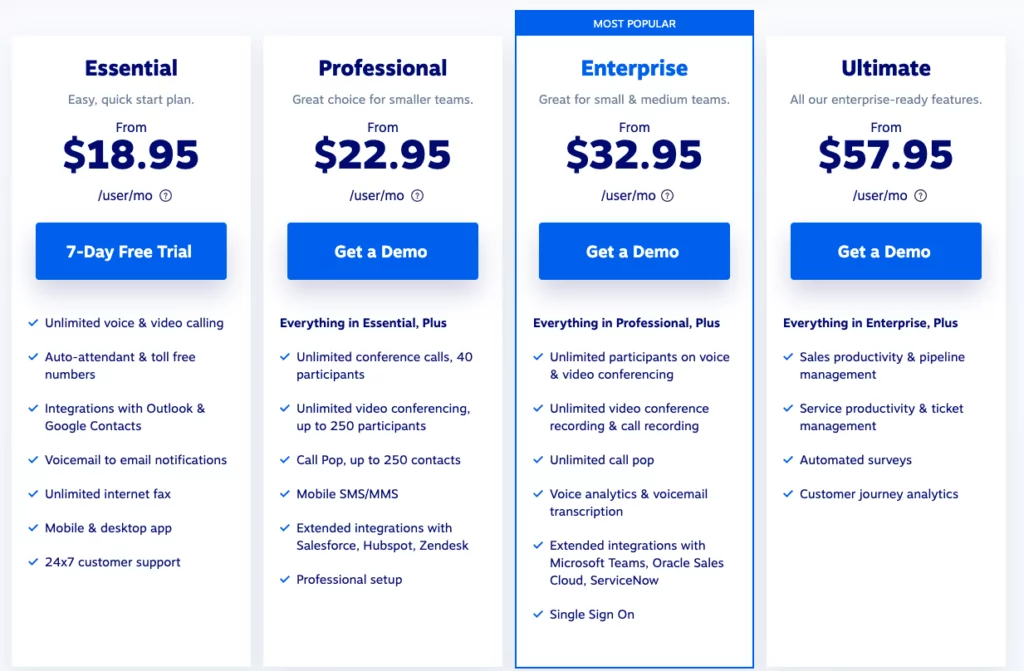
Nextiva’s enterprise plans are built for medium to large corporations. Teams get access to unlimited voice and video conferencing, call recording, voicemail transcriptions, professional setup, and sales and pipeline management. Plus, it integrates with a number of third-party tools like Microsoft Teams, Oracle Sales Cloud, ServiceNow, Salesforce, HubSpot, and Zendesk. Unfortunately, you do not get a dedicated account manager for your team which may make implementing their solution in an enterprise setting more stressful.
Pricing for Nextiva’s ultimate (enterprise) solution starts at $57.95 per user per month.
Choose OpenPhone as your enterprise VoIP solution
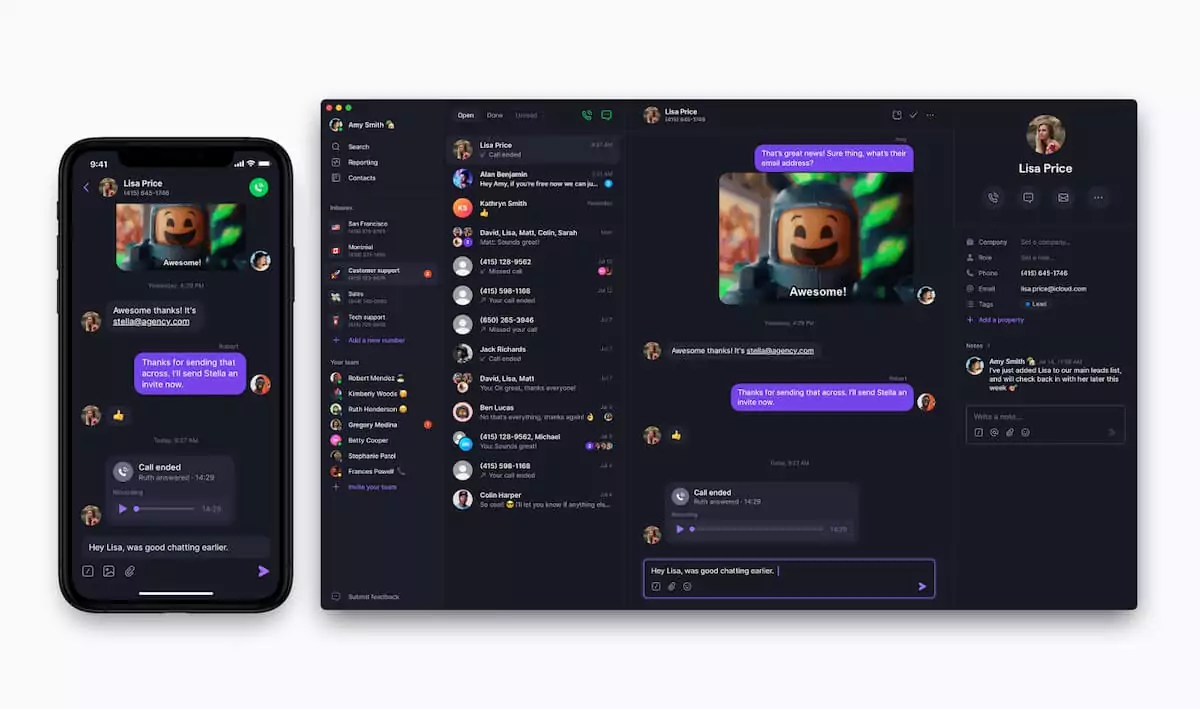
An enterprise VoIP solution is a VoIP plan built specifically for large teams, scaling departments, and corporations. With an enterprise plan, you will need additional bandwidth, custom-designed solutions, and excellent customer service in order to meet your needs.
When searching for an enterprise VoIP solution, it’s important to do your due diligence. Always speak directly with a sales rep, asking about any hidden fees, contracts, setup and maintenance requirements, advanced features, third-party integrations, and whether you will get a dedicated account manager.
OpenPhone is the best enterprise VoIP solution because it’s easy to use, set up, and maintain — even for large teams. With OpenPhone, you gain access to a dedicated account manager who can tailor your plan to your needs. Plus, you get access to all of OpenPhone’s advanced features, including:
- Shared phone numbers
- Internal team threads on any phone calls, voicemail, and text messages
- Zapier, HubSpot, and Slack integrations
- Advanced auto-attendant
- Auto-call recordings to ensure your team’s communication is consistent
- Saved text snippets to save your team time on repeat messages
- Auto-replies to set clear expectations with customers
- Call transferring
- Analytics and reporting
Ready to see how OpenPhone enterprise can transform your business? Contact our sales team now.
